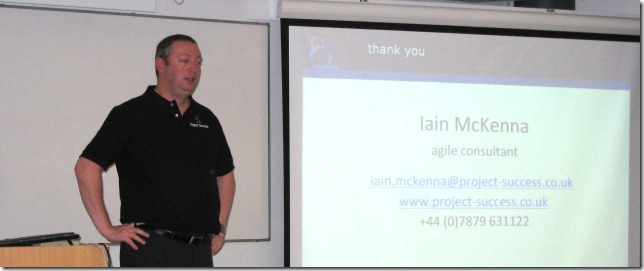
Slides available for download in our download section.
Iain McKenna of Project Success gave the Oxfordshire Branch of BCS a most informative, interesting and relevant talk on 15 October on Agile Project Management. But it was more than this. It was about the Scrum systems development methodology – and how it addresses the concerns of rigour, reliability and scale in heavyweight (or overweight) SDMs such as PRINCE2.
Agile is now a top business issue, not just a computing issue, because our global village is one of rapidly increasing change, and windows of opportunity are brief.
As for the traditional, heavyweight methodologies, how many projects do you know that have been delivered on-time and on-budget? How many with customers/users satisfied? Can customers really know and articulate up front what they need? Is up-front analysis cost-effective and worthwhile?
As to the key concepts in Agile and Scrum here’s the Do-able Dozen:
- A focus on value; cost v. benefit; build only what’s needed.
- Close collaboration and constant review between IT and customers/users; rapid feedback and ability to change.
- User/Customer Stories – a common language; documentation; different levels of granularity & detail as required, these comprise the Product Backlog.
- Start simple and iterate for reduced risk.
- Plan in detail for the next Sprint cycle only (one to four weeks).
- Small and frequent releases (every three to six mos.) to reduce risk, prove progress, deliver value, and satisfy customers.
- Short cycle times (e.g. one to four weeks to deliver valuable, production quality software).
- Continuous integration – frequent automated integration and testing of system components.
- Simple and tidy code for easy and cost-effective change.
- Test-driven development; production quality code delivered early; links back to and demo for User Stories.
- Behavioural & process improvement – during the process itself.
- Team culture and openness; Burn-Down (progress) Maps prominent.
So what’s the big challenge in adopting Agile and Scrum? Iain’s answer: People! It’s people who are the key to success. To that we might add the preconceptions and myths about Agile and Scrum, such as it being instant, easy and lightweight.
Not surprisingly, therefore, and since Agile addresses a fundamental need in today’s business environment, the demand for Agile in an organisation needs to come from the Business side rather than the IT side, or at least be fully appreciated, understood and endorsed by the Business side.
But here’s a surprising thing: some organisations are beginning to use Agile and Scrum outside and beyond systems development. It works as a process for rapid product development in other areas. Perhaps not surprising as its roots are in Japanese manufacturing.
Iain McKenna is one of those people who has the experience and ability to articulate and implement Agile. We appreciate his taking the time out to speak to us, and his patience in answering all our questions so well.

